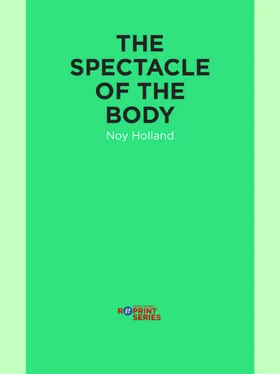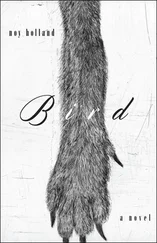The blunt end of the man’s arm clenched and bloomed. It lay beside the food, on the burlap top of the table.
Amesegginallehu is “to give thanks.”
Peristalsis is what makes your food go down.
Esophagitis had seized the throat of my father.
“In our country,” the man said, “we feed the old and the very young and those who travel from other places. Gusha is like a kiss,” he said, “a gesture of thanks, or welcome.”
The man lifted the food to me, a handful of fowl and beans wrapped in damp bread.
It was a time also of dreams. In one dream, I live with my family in a farmhouse in middle Oho.
I used to feed my father. I used to stroke the skin of his throat, not altogether gently, trying to make the food go down. He was not an old man then.
He leaned toward me. The tips of his fingers touched my teeth, the inside skin of my lips. His name? I cannot pronounce the man’s name, though if it mattered, perhaps I could spell it.
Gusha is a gesture of welcome, or thanks.
Tejj is a wine made from honey.
The hand works like a claw, without the raptor’s hurry, without welcome, and although for a time I could not swallow and did not want to be fed, neither did I refuse it.
I cannot say if my father is dead now, or if my father keeps living.
Another night, in a room in a hotel named for the empress on a hilltop in Addis Ababa, I dream again of middle Ohio, where I have never been. To reach the pond, I must walk through the field and through a copse of trees. Nights pass before the dream elaborates, before I reach the trees. In the shade of the first tree I reach is the body of a small horse, fully grown, no bigger than a schnauzer. The coat of the horse is a deep brackish gray, its mane cropped and silver, a red collar around its neck.
I used to dream only words — dark letters, evenly blocked, traversing at a steady speed across a blank screen.
Here is something true: in Addis Ababa, in the wake of some battle, the prisoners were made to march through the streets — these prisoners being mostly women — these women made to march through the streets, carrying the genitals of their husbands, of their fathers, and of their sons. I imagine these relics — enshrined, anointed, perhaps prayed to.
I tried to explain about the gusha —my reluctance — that I did not wish to be fed. There was no such gesture in my country.
“In my country,” I said, “the old feed themselves. The young go other places.”
It occurred to me to wonder what language God would speak, if He spoke. He sitteth at the right hand of God. The son of God. Our Father. Jesus Christ was a black man rent from the womb of a woman. In Hebrew, Eve is “lady of the rib.” In Sumerian, from which the Hebrew is translated, Eve is “lady of the rib” and “lady who makes live.” In Hebrew, of course, the story is a simpler story.
In Addis Ababa, some twelve years after a girl is born, her clitoris, with a thin, curved knife, is cut from her.
I have heard it called a flower, the mouth of a woman.
Let me put my mouth on your flower.
Labia comes from the Latin word meaning “lips.” Clitoris is from the Greek: “to shut.” Pudendum comes also from Latin, the gerundive of pudēre , “to cause shame.”
In Mali, perhaps elsewhere — I only know what I know, what I have seen and what is written — the adulteress is given a cayenne-and-black-ant douche, and she is tethered to a stake in the village.
The goat bleated, the bigger boys astride its back. The small boy kept watching.
“In Mali,” the man said. “But there is no such punishment here. Here is water, here is wine, bread. Please.”
But I did not wish to be fed. The man’s arm clenched and bloomed, pushed across the top of the table.
It happens, depending on the girl’s father, some twelve years after the girl is born, that the entire labia majora is taken, cut away, washed with urine or spit, poultice with the shit of ox — and who shoos flies from this, pinned butterfly-winged to some wall?
The men emerge from the shade, in the dream, made by the copse of trees I must pass before I reach the pond. They have killed, besides the small horse, a goat, and a heifer, which hangs by its neck from the branch of the tree.
Do you want to? the men say. They say it together, a chant. Do you want to? Do you want to?
The man stood up from his chair. A chair is a pile of burlap sacks wrapped with what string there is. The man was wearing a belt; worn blue trousers.
The goat stumbled on its tether, on the ball kicked back and forth by the boys through the goat’s legs. It was not a ball quite, or at least it was not my idea of a ball, nor was the sound made the sound I knew of a bare foot and the skin of a ball meeting.
When I get there, the men are behind me; my father is inside. The doors are locked to the house.
Let me acknowledge these as human crimes, of largely indifferent significance — those of Addis Ababa, of Mali, of middle Ohio. Let me say I was no stranger then to the feel of a man at the back of my throat, to the clench and bloom of me.
I used to feed my father. I do not imagine it matters much if this is dream, recollection, hope, regret. He has grown quite thin, quite old. Without warning, as things happen in dreams and in life, my father’s mouth is open, his eyes, but even as I feed him, he does not breathe.
I have not served him. The bed is narrow. It creaks. They will come soon — those who come to bear the dead away. I am bleeding. My skirt is wide, drawn like a sheet across him.
It is a scene to me of such splendor, such ruin. I put my mouth to my father’s mouth, my flower — and by God, by Christ, for the ways I cannot serve him, I bleed.











